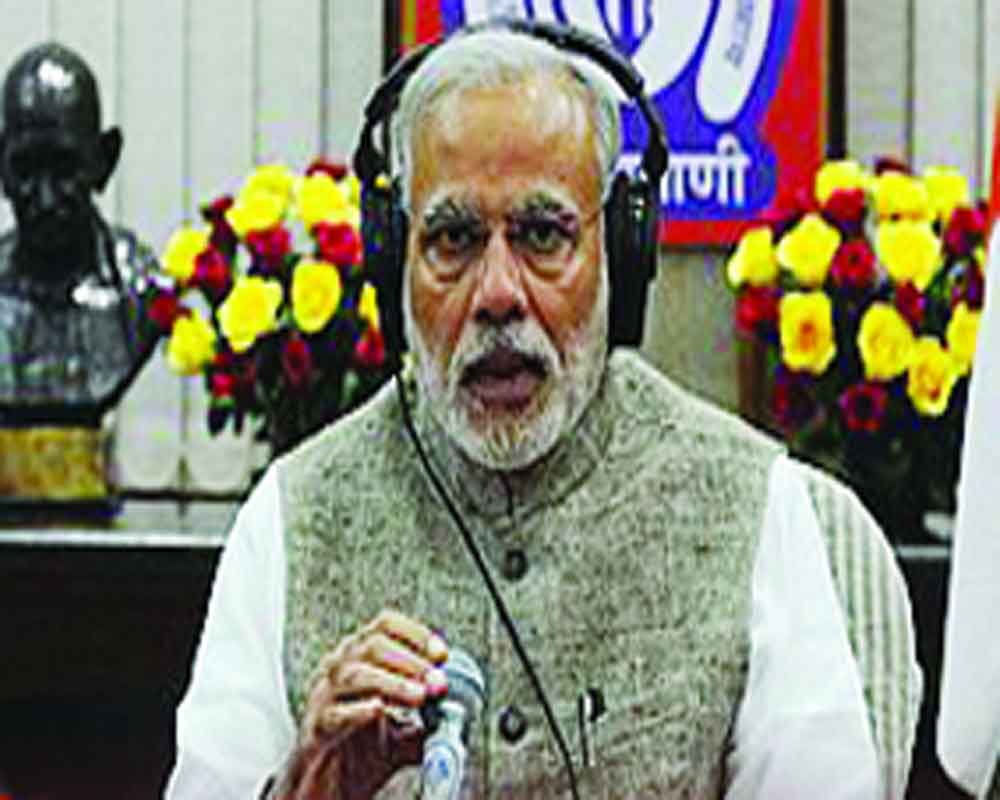Prime Minister Narendra Modi on Sunday, in his monthly radio talk ‘Mann ki baat’, spoke about ‘Padma Awards’ echoing “even in those areas which used to be Naxal affected” with the awardees recognised for showing the “right path to the misguided youth”.
Addressing the people, the Prime Minister took on a range of issues including the environment, wetlands, e-waste, and the importance of millets and yoga in health, and also praised the Republic Day celebrations of this year.
Drawing the attention of listeners to the grand Republic Day parade and Padma awards, Modi said, “This year the echoes of the Padma Awards are being heard even in those areas which used to be Naxal affected. Due to their efforts, those who show the right path to the misguided youth in Naxalite-affected areas have been honored with Padma Awards.
“For this, Ajay Kumar Mandavi, who does wood carving in Kanker, and Parshuram Komaji Khune, associated with the famous Jharipatti Rangbhoomi of Gadchiroli, have also received this honour.”
This time there has been a good representation of the tribal community and people associated with tribal life among the Padma awardees.
“Tribal life is different from the hustle and bustle of the cities; its challenges are also different. Despite this, tribal societies are always ready to preserve their traditions. Efforts are also made to preserve and research aspects related to tribal communities,” said Modi.
“Similarly, many great personalities who have worked on tribal languages like Toto, Ho, Kui, Kuvi and Manda have received Padma Awards. It is a matter of pride for all of us.
“Dhani Ram Toto, Janum Singh Soy and B. Ramakrishna Reddy ji…the whole country has become familiar with them now” , he said.
The Prime Minister spoke about the importance of 'millets’ and said 2023 will be the 'International Year for Millets'. Modi mentioned the names of people from different states who have dedicated their professional lives to promoting ‘millet-made’ food.
Modi said a revolution is underway in the health sector because of public participation in campaigns such as International Yoga Day and International Year of Millets.
“Just as people have made yoga and fitness a part of their lives by active participation, similarly they are also adopting millet on a large scale,” he said.
“What is common between Yoga Day and our different types of coarse grains – Millets, then you might think…what is this comparison? If I say that both have a lot in common, you will be surprised. In fact, the United Nations has taken the decision of both International Yoga Day and International Year of Millets after India’s proposal.
“Secondly, yoga is also related to health and millets also play an important role in health. The third thing is more important – a revolution is on the way because of public participation in both campaigns. Just as people have made yoga and fitness a part of their lives by taking active participation on a large scale; similarly people are adopting millets on a large scale”, said Modi.
“People are now making millets a part of their diet. A huge impact of this change is also visible. On the one hand, the small farmers who traditionally used to produce millets are very excited. They are very happy that the world has now started understanding the importance of millets. On the other hand, FPOs and entrepreneurs have started efforts to market millets and make them available to people”, he said.
“Have you ever heard the word Milletpreneurs? “, asked the Prime Minister.
A women's self-help group in the tribal district Sundargarh is associated with Odisha Millets Mission. They make biscuits, cakes and other eatables from millets,” Modi said.
He said a revolution is underway in the health sector because of public participation in campaigns such as International Yoga Day and International Year of Millets.
“Just as people have made yoga and fitness a part of their lives by active participation, similarly they are also adopting millet on a large scale,” the Prime Minister said.
Drawing the attention of people towards the problem of e-waste, Modi said, “Proper disposal of e-waste can become a great force to build a circular economy. Today's latest devices are also the e-waste of the future. Whenever someone buys a new device or replaces his old device, it becomes necessary to keep in mind whether it is discarded properly or not.”
The Prime Minister also touched on India being the largest democracy in the world.
“we Indians are proud of the fact that our country is also the Mother of Democracy. Democracy is in our veins, it is in our culture – it has been an integral part of our work for centuries. By nature, we are a Democratic Society”, he said
“ Dr. Ambedkar had compared the Buddhist monks union to the Indian Parliament. He described it as an institution where there were many rules for Motions, Resolutions, Quorum, Voting and counting of votes. Babasaheb believed that Lord Buddha must have got inspiration from the political systems of that time” he said The Prime Minister also hailed India's ranking in the Global Innovation Index and said India has improved and achieved a good rank


























